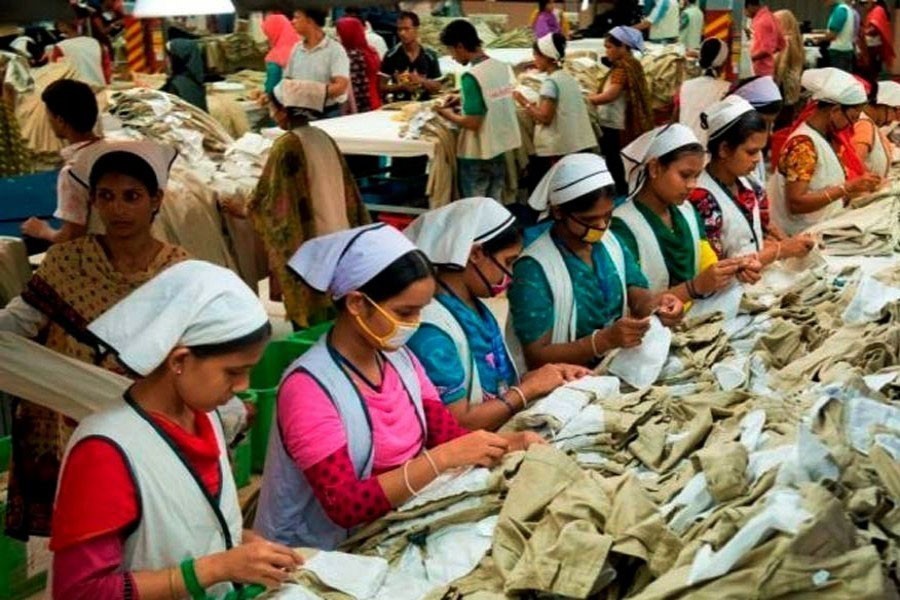Siyam Hoque
Published:2020-06-19 02:15:36 BdST
BD among 10 worst countries for workers
Bangladesh, for the fourth consecutive year since 2017, has been ranked among the 10 worst countries in the world where labour rights are not guaranteed, according to a global survey.
The Global Rights Index 2020 launched by International Trade Union Confederation (ITUC) on June 18 pointed out violence, mass dismissals and regressive laws for the worst situation in Bangladesh.
in Bangladesh, about 46 per cent out of 1104 union registration applications examined between 2010 and 2019 were rejected by the Department of Labour.
Of the 575 unions registered, 62 have been busted or are inactive due to anti-union retaliation, and 81 unionised factories have closed, the survey revealed.
The other nine worst countries are Brazil, Colombia, Kazakhstan, the Philippines, Turkey and Zimbabwe, India, Egypt and Honduras.
Workers in Bangladesh could not exercise their basic rights at work without fear of retaliation and brutal repression, according to the survey.
The seventh edition of the ITUC 2020 index ranked 144 countries in 1-5 categories against 97 internationally recognised indicators to assess where workers' rights are best protected in law and in practice.
The trend, by governments and employers, to restrict the rights of workers through limiting collective bargaining, disrupting the right to strike, and excluding workers from unions, has been made worse by a rise in the number of countries that impede the registration of unions, according to the annual index.
A new trend identified in 2020 shows a number of scandals over government surveillance of trade union leaders in an attempt to instill fear and put pressure on independent unions and their members.
The General Secretary of the ITUC, Sharan Burrow, said: “These threats to workers, our economies and democracy were endemic in workplaces and countries before the Covid-19 pandemic disrupted lives and livelihoods.”
In many countries, the existing repression of unions and the refusal of governments to respect rights and engage in social dialogue has exposed workers to illness and death and left countries unable to fight the pandemic effectively, she added.
The ITUC ranked Bangladesh with 31 other nations, including Cambodia, China, India, Pakistan and Thailand, in the fifth category. The fifth category is a sign of "no guarantee of rights".
"The countries with the rating of 5.0 are the worst places in the world to work in," the report said.
"While the legislation may spell out certain rights, workers have effectively no access to these rights and are, therefore, exposed to autocratic regimes and unfair labour practices," it added.
About 85 per cent of countries violated the right to strike and 80 per cent of countries violated the right to collectively bargain, according to the key findings.
The number of countries that impeded the registration of unions has increased, while 56 out of the 144 surveyed countries deny or constrain freedom of speech, up from 54 in 2019.
Workers had no, or restricted, access to justice in 72 per cent of countries, workers experienced arbitrary arrests and detention in 61 countries, the report revealed.
It added that workers had no, or restricted, access to justice in 72 per cent of countries with severe cases reported in Bangladesh, where labour courts have accumulated a three-year backlog, while a staggering 18,000 cases filed by workers were still pending.
In Bangladesh, a new section of the Department of National Security Intelligence (NSI) under the Home Ministry was created to target garment trade unionists for surveillance, the report said.
Since September 2019, garment federations have been visited by industrial police asking them for their monthly activities, expenditures, members’ names, participants of their activities, as well as the labour disputes they handled.
According to the global index, nine countries, including Palestine, Sudan, Syria and Yemen, scored even worse at 5+.
This rating is linked to dysfunctional legislation as a result of any internal conflict or military occupation and has equally limited labour rights like the fifth category.
Forty-one countries, including Chile and Nigeria, with systematic rights violations, have been ranked fourth.
Argentina, Australia, Nepal, Russia and United Kingdom are among 24 countries that have ranked third with regular violations of rights.
The second category includes 26 countries like Canada, Belgium, Singapore and Spain with repeated rights violations.
Germany, Italy and Netherlands are among 12 countries that have been top-ranked with irregular violations of rights, according to the index.
Unauthorized use or reproduction of The Finance Today content for commercial purposes is strictly prohibited.


